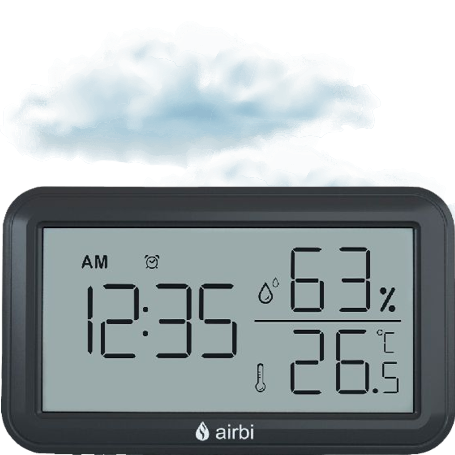Measuring instruments
A high-quality measuring instrument is important for monitoring the indoor climate. Relying on your feelings alone is often not enough and can lead to subsequent health issues.

Airbi DUO Color
Airbi DUO Color is a home weather station with 2 wireless transmitters already in...

Airbi HOME
Airbi HOME is an exceptionally well-equipped weather station with 3 sensors.

Airbi FORECAST
Airbi FORECAST is a WiFi weather station with smart weather forecast downloaded from...

Airbi TALK
Digital alarm clock with voice notification of time and indoor temperature in czech...

Airbi DUO
Airbi DUO is a home weather station with 2 wireless transmitters already in the box....

Airbi NOTE
Digital clock with calendar, notifications and photo frame
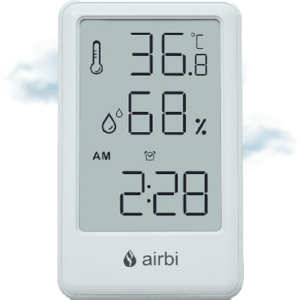
Airbi FRAME
FRAME is a room thermometer and hygrometer that is used to monitor indoor temperature...
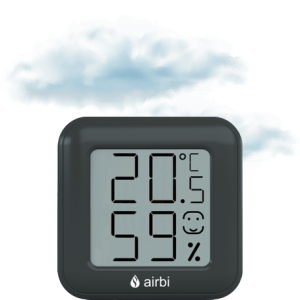
Airbi SMILE
An unsuitable home climate can cause decent damage to your health and household equipment....

Airbi INDOOR
INDOOR is a room thermometer and hygrometer that is used to monitor indoor temperature...
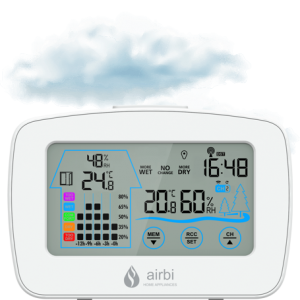
Airbi CONTROL
Keep the climate under control. The Airbi CONTROL measures temperature and humidity,...
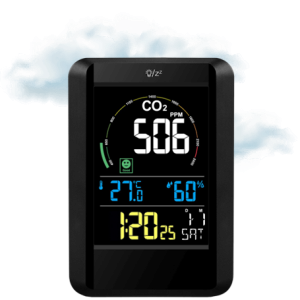
Airbi CO2AIR
With this instrument you can easily measure CO2, temperature and humidity. If the...

Airbi POOL
POOL is especially popular with all pool and pond owners. In addition to water temperature,...
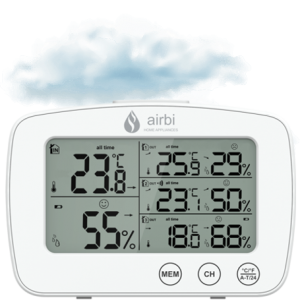
Airbi TRIO
Climate expert - this is the Airbi TRIO, which is equipped with three wireless temperature...
| PRODUCT | SMILE | INDOOR | FRAME | CONTROL | TRIO | DUO | DUO COLOR | POOL | TALK | NOTE | CO2AIR |
|---|---|---|---|---|---|---|---|---|---|---|---|
| Principle | interior | interior | interior | wireless (with sensor) | wireless (with sensor) | wireless (with sensor) | wireless (with sensor) | wireless (with sensor) | interior | interior | interior |
| Photo |  |
|  |
|
| 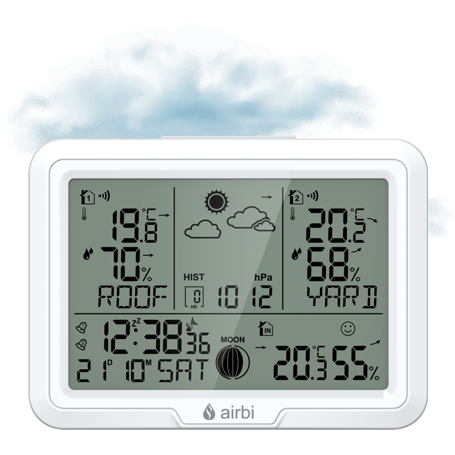 | 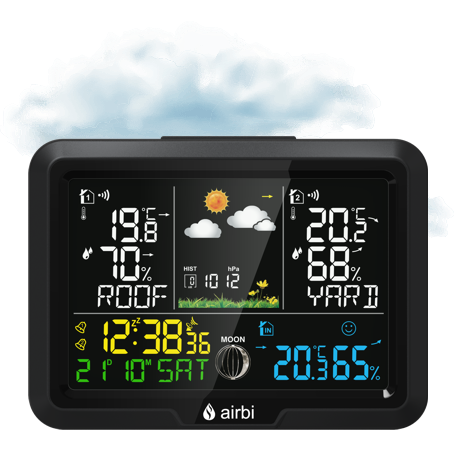 | 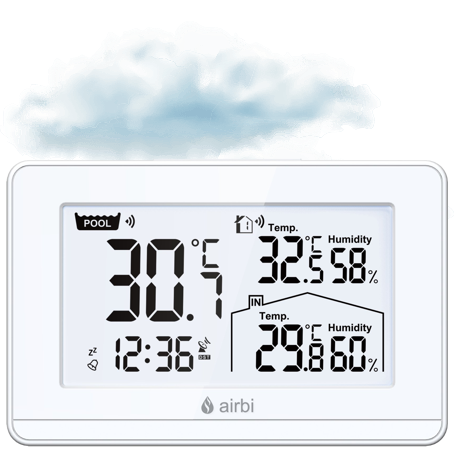 | 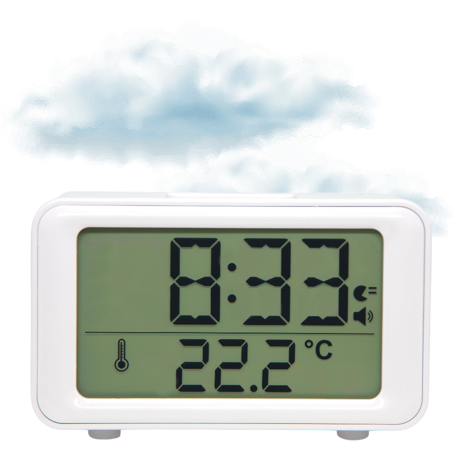 | 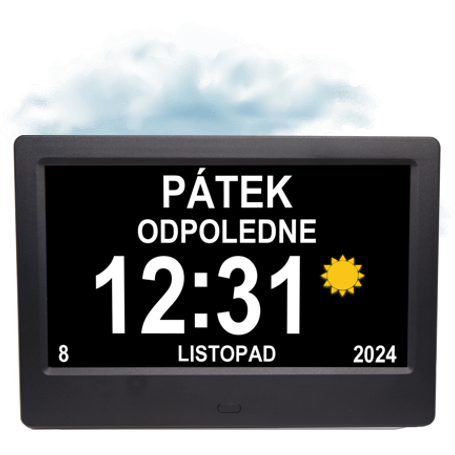 |  |
| PROPERTIES | |||||||||||
| Measured quantities | temperature, humidity (indoor) | temperature, humidity (indoor) | temperature, humidity (indoor) | temperature, humidity (indoor and outdoor) | temperature, humidity (indoor and outdoor) | temperature, humidity (indoor and outdoor), pressure | temperature, humidity (indoor and outdoor), pressure | temperature, humidity (indoor and outdoor), water temperature | temperature (indoor), time | time | CO2 level, temperature, humidity (indoor) |
| Number of wireless sensors | - | - | - | 1 | 3 | 2 | 2 | 2 | - | - | - |
| Indoor quality indication (smile) | YES | NO | NO | NO | NO | YES | YES | NO | NO | NO | YES |
| Backlight | NO | NO | NO | YES | YES | YES | YES | YES | YES | YES | YES |
| Memory for MAX / MIN values | YES | YES | YES | YES | YES | YES | YES | YES | NO | NO | YES |
| Indication of humidity comfort | NO | NO | NO | NO | YES | YES | YES | NO | NO | NO | NO |
| Trend in the development of levels | NO | NO | NO | NO | YES | YES | YES | NO | NO | NO | NO |
| Low battery indication | NO | NO | NO | YES | YES | YES | YES | YES | NO | NO | YES |
| Radio controlled time | NO | NO | NO | YES | NO | YES | YES | YES | YES | NO | NO |
| Ventilation Guide | NO | NO | NO | YES | NO | NO | NO | NO | NO | NO | NO |
| Fungi warning | NO | NO | NO | YES | NO | NO | NO | NO | NO | NO | NO |
| Frost warning | NO | NO | NO | YES | NO | YES | YES | NO | NO | NO | NO |
| Alarm clock | NO | YES | YES | NO | NO | YES | YES | YES | YES | NO | YES |
| Snooze function | NO | YES | YES | NO | NO | YES | YES | YES | YES | NO | YES |
| Chime function | NO | YES | YES | NO | NO | NO | NO | NO | YES | YES | NO |
| TECHNICAL DATA | |||||||||||
| Base temperature measurement range | -20 to 60 °C | 0 to 50 ° C | 0 to 50 ° C | -10 to 50 ° C | -10 to 50 ° C | -10 to 50 °C | -10 to 50 °C | -10 to 50 °C | 0 to 50 ° C | - | -10 to 60 °C |
| Sensor temperature measurement range | - | - | - | -20 to 60 ° C | -20 to 60 ° C | -40 to 60 °C | -40 to 60 °C | -40 to 60 °C | - | - | - |
| Base humidity measurement range | 20 to 95 % | 20 to 95 % | 20 to 95 % | 20 to 95 % | 20 to 95 % | 20 to 95 % | 20 to 95 % | 20 to 95 % | - | - | 20 to 95 % |
| Sensor humidity measuring range | - | - | - | 20 to 95% | 20 to 95% | 20 to 95 % | 20 to 95 % | 20 to 95 % | - | - | - |
| Accuracy of measurement | ± 1 °C (0 °C to +40 °C) ± 5 % (at 40 ... 80 %) | ± 1 °C (0 °C to +40 °C) ± 5 % (at 40 ... 80 %) | ± 1 °C (0 °C to +40 °C) ± 5 % (at 40 ... 80 %) | ± 1 °C (0 °C to +40 °C), otherwise ± 2 °C ±5 % (at 40 to 80 %) | ± 1 °C (0 °C to +40 °C), otherwise ± 2 °C ± 5 % (at 40 to 80 %) | ± 1 °C (0 °C to +50 °C), otherwise ± 1.5 °C ± 5 % RH | ± 1 °C (0 °C to +50 °C), otherwise ± 1.5 °C ± 5 % RH | ± 1 °C (0 °C to +50 °C), otherwise ± 1.5 °C ± 5 % RH | ± 1 °C | - | ± 1 °C (0 °C to +40 °C), otherwise ± 2 °C ± 5 % RH (at 40 to 80 % RH) ± 50 ppm or 5 % |
| Base power supply | 1 x CR2032 battery (included) | 1x 1.5V AAA battery (not included) | 1x 1.5V AAA battery (not included) | 3x 1.5 V AAA batteries (not included) | 3x 1.5 V AAA batteries (not included) | 3x 1.5 V AAA batteries or mains adapter (not included) | 3x 1.5 V AAA batteries or mains adapter (power adapter included, batteries not included) | 2x 1.5 V AAA batteries (not included | 2x 1.5 V AA batteries (not included | mains adapter (included) | mains adapter, 3x 1.5 V AAA batteries (power adapter included, batteries not included) |
| Sensor power supply | - | - | - | 2x 1.5 V AAA batteries (not included) | 2x 1.5 V AAA batteries (not included) | 2x 1.5 V AAA batteries (not included) | 2x 1.5 V AAA batteries (not included) | 2x 1.5 V AAA batteries (not included | - | - | - |
| Base dimensions | 73 x 73 x 15 mm | 118 x 68 x 22 mm | 70 x 113 x 14 mm | 152 x 104 x 22 mm | 152 x 104 x 22 mm | 140 x 103 x 25 mm | 140 x 103 x 25 mm | 150 x 98 x 24 mm | 120 x 70 x 50 mm | 179 x 21 x 126 mm | 118 x 22 x 68 mm |
| Sensor dimensions | - | - | - | 50 x 105 x 26 mm | 50 x 105 x 26 mm | 50 x 105 x 26 mm | 50 x 105 x 26 mm | 50 x 105 x 26 mm 80 x 80 x 160 mm | - | - | - |
| Base weight | 140 g | 72 g | 69 g | 179 g | 179 g | 176 g | 176 g | 165 g | 176 g | 231 g | 72 g |
| Sensor weight | - | - | - | 52 g | 52 g | 56 g | 56 g | 56 g, 145 g | - | - | - |
How to choose the right measuring instrument?
Indoor and outdoor levels
When choosing an appropriate measuring insturment, it is important to determine what you wish to measure. If you are only interested in controlling the humidity in the room, a room hygrometer is sufficient, which usually measures the temperature.
Often, for ventilation it's a good idea to know the situation outside the window. Devices with a wireless sensor are suitable for these purposes. Pay attention to the sufficient range of the signal, the wall and other obstacles between the sensor and the base can interfere with it.
Ventilation warning
Some measuring instruments that monitor the indoor and outdoor temperature and humidity can help you with ventilation. It will warn you that ventilation will help return the internal humidity value to normal.
Indoor memory
If you want to see the values measured by the instrument when you were not looking, the indoor memory function is useful. Most measuring instrument with memory show maximum and minimum measured values since last reset or in the last 24 hours.
Development chart
When measuring values, it is often advisable to monitor not only the current value, but also recent developments. A value development chart, which tells you when the air condition was good and when not, is excellent for this.
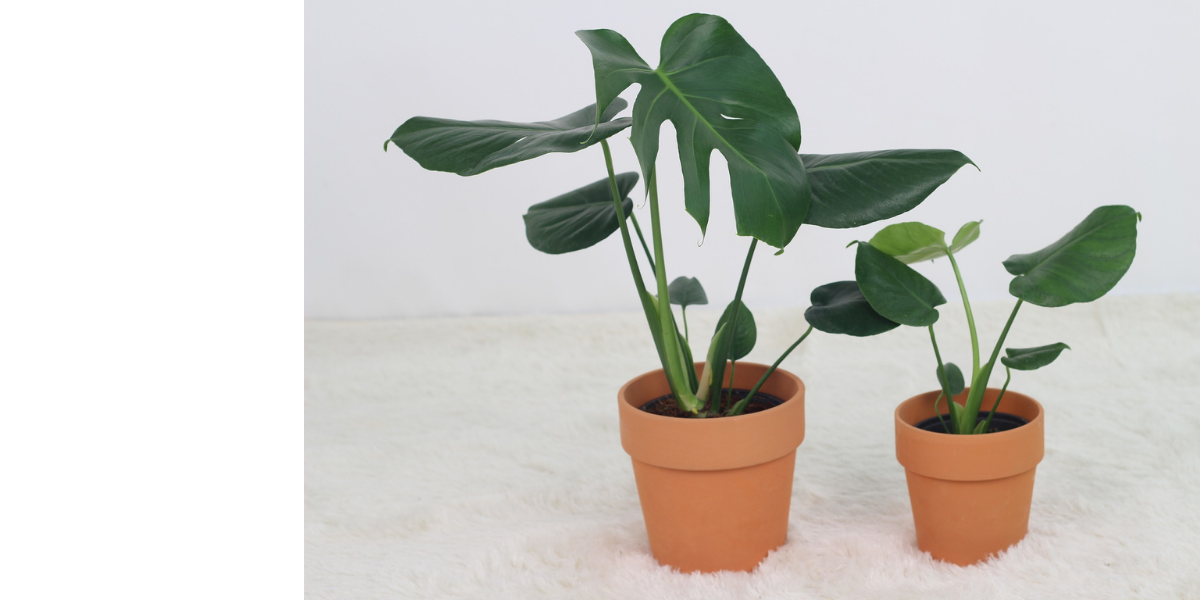
What about humidity?
It is important to distinguish between relative and absolute humidity. While absolute humidity directly expresses a specific value for the amount of water vapour in the air (in g / m-3), the relative humidity indicates the ratio between the actual and the maximum amount of water vapour in the air (in%). Relative humidity depends on the air temperature - the higher the temperature, the more water vapour the air it is able to hold.
